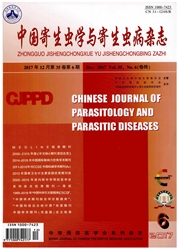

 中文摘要:
中文摘要:
由于免疫功能低下人群不断增长,机会性致病寄生虫感染相应的增多。目前。人们对机会性致病寄生虫的生物学知识认识不足,对虫种的鉴定分型、人群感染状况、感染的来源及方式等的研究较少,多数机会性寄生虫研究缺乏动物模型。HIV在特殊人群中的流行,促进了对机会性感染的研究和认识,大大降低了机会性感染的发病率。机会性寄生虫病的临床表现复杂,临床医生的认识不足,缺乏敏感、特异性的检测方法和治疗药物.是感染性疾病防治的瓶颈.大量的基础研究的支撑、发掘诊断和治疗的靶分子是解决这些问题的关键。
 英文摘要:
英文摘要:
The incidence of opportunistic parasitic infections is increasing as a result of the growing population with immune deficiency. Currently, studies on opportunistic parasitic infections are limited by the lack of animal models, due to the limited biological knowledge on the opportunistic parasitic pathogens as well as the small number of studies on species identification and typing, epidemiologic status, as well as the source and route of infection. The prevalence of HIV has promoted the research and understanding of opportunistic parasitic infections, which, in turn, has greatly reduced the morbidity and mortality of opportunistic infections. However, there still exists a bottleneck for the control and prevention of infectious diseases, i.e., the lack of sensitive and specific diagnostic methods and effective therapy, due to the complicated clinical manifestations and insufficient notification by clinical physicians. Supported by accumulating basic research, the discovery of diagnostic and therapeutic molecular targets is the key to overcome these problems.
 同期刊论文项目
同期刊论文项目
 同项目期刊论文
同项目期刊论文
 期刊信息
期刊信息
